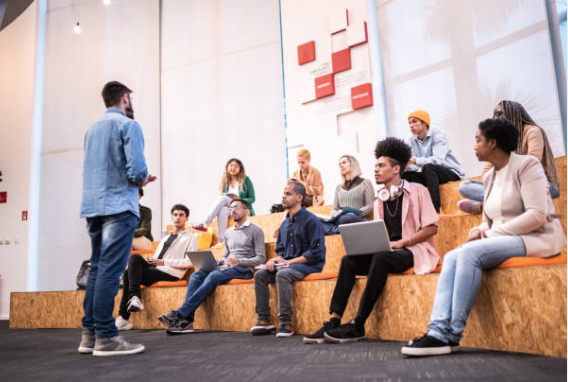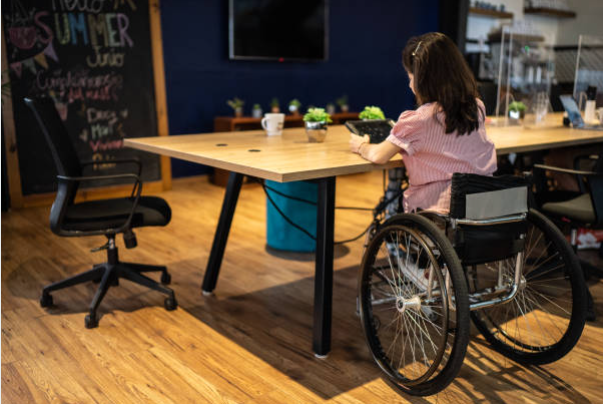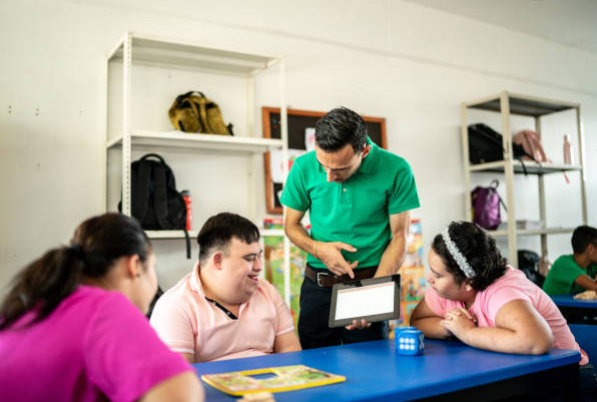Training Programs For Disabled Individuals In Tech
In the rapidly advancing landscape of technology, diversity is increasingly recognized as a driving force behind innovation and progress. However, a notable gap persists in the underrepresentation of disabled individuals within the tech industry, limiting its inclusivity and overlooking a wealth of untapped talent and unique perspectives. To address this, various training programs, including those focused on computers for the disabled, have emerged. These initiatives aim to bridge the gap and empower disabled individuals, enabling them not only to participate but also to flourish in the dynamic world of technology.
Bootcamps For Disabled Individuals in Tech
Tech boot camps for disabled individuals, like the Perkins Eastman Coding Bootcamp, provide a fast and personalized route to essential skills.

Emphasizing accessibility and community support, these programs empower participants, breaking down barriers for success in the tech industry.
Perkins Eastman Coding Bootcamp:
The Perkins Eastman Coding Bootcamp stands out as a shining example of accessibility and personalized support.
This intensive program is meticulously designed to swiftly impart practical skills, ensuring that disabled individuals receive tailored assistance to overcome unique challenges they might encounter in the fast-paced tech environment.
The success stories emerging from this boot camp serve as a testament to its effectiveness in not only equipping individuals with technical know-how but also instilling the confidence needed to navigate the complex landscape of the tech industry.
Code For Inclusive Technologies (CFIT):
CFIT takes center stage in the realm of inclusive tech initiatives. By concentrating on the development of technologies that cater to diverse needs, CFIT aligns perfectly with the aspirations of disabled individuals in the tech world.
This program goes beyond imparting technical skills; it fosters an understanding of the critical importance of inclusive design.
Graduates from CFIT are not just skilled technologists but advocates for inclusivity, ready to contribute meaningfully to an industry that is continually evolving.
App Academy
App Academy adopts a comprehensive approach to training disabled individuals in tech. Recognizing that success in the tech industry requires more than just technical prowess, this program provides a supportive learning environment.
App Academy acknowledges the unique challenges faced by disabled individuals and addresses them through personalized learning plans and mentorship.
By fostering a sense of community and collaboration, App Academy prepares individuals not just for a career but for a sustained and fulfilling journey in the tech field.
Universities And Colleges For Disabled Individuals In Tech
Tech-focused universities and colleges, such as the Georgia Institute of Technology and the University of Washington DO-IT Access Team, prioritize inclusivity by integrating accessibility into courses.

These campuses provide comprehensive support, ensuring disabled individuals receive not only technical education but also a nurturing environment for success in the tech industry.
Georgia Institute Of Technology:
Renowned for its commitment to inclusivity, the Georgia Institute of Technology’s Center for Inclusive Design & Innovation stands as a beacon of progress.
Going beyond the traditional approach to education, this center creates an inclusive campus environment.
By integrating accessibility into various courses, the institute ensures that disabled individuals receive a holistic education.
This approach goes beyond technical skills, fostering a mindset that understands the importance of inclusivity in creating technology that truly serves diverse populations.
Rochester Institute of Technology:
The National Technical Institute for the Deaf (NTID) at the Rochester Institute of Technology serves as a haven for deaf and hard-of-hearing students pursuing STEM education.
NTID’s commitment to accessibility extends beyond academics to a fully accessible campus. This environment not only facilitates learning but also instills confidence in disabled individuals, showing them that they can thrive in a field where their unique perspectives are invaluable.
University of Washington DO-IT Access Team:
The University of Washington’s DO-IT Access Team plays a pivotal role in breaking down barriers for disabled individuals.
Offering accessible courses and promoting a supportive learning atmosphere, the team equips students with the skills needed to excel in technology-related fields.
The emphasis on accessibility goes beyond the classroom, contributing to a broader cultural shift within the university toward recognizing the potential of disabled individuals in tech.
Online Learning Platforms For Disabled Individuals In Tech
Online learning platforms like Udacity, Coursera, and edX revolutionize tech education for disabled individuals. Prioritizing inclusivity and flexibility, these platforms offer courses tailored to diverse needs, breaking down barriers and providing an accessible and empowering learning experience.
Udacity:
Udacity, in collaboration with the World Wide Web Consortium (W3C), stands at the forefront of online learning platforms designed with accessibility in mind.
As a pioneer in this space, Udacity goes beyond conventional teaching methods to ensure a high level of inclusivity.
The platform’s commitment to incorporating inclusive design principles into its courses makes tech education accessible to a broader audience.
By providing a flexible and online learning environment, Udacity caters to diverse learning styles, acknowledging that disabled individuals may face unique challenges in traditional educational settings.
Coursera:
Coursera, with its expansive array of courses designed to meet the needs of disabled individuals in tech, exemplifies the potential of online education.
The user-friendly platform and commitment to accessibility make Coursera a valuable resource for learners seeking tech skills at their own pace.
With partnerships with top universities, Coursera ensures that disabled individuals have access to high-quality content that is not only engaging but also relevant to the ever-evolving tech landscape.
Energy Dispersive X-ray (EDX):
Energy Dispersive X-ray (EDX), as a provider of courses from universities and institutions worldwide, plays a pivotal role in democratizing access to tech education.
Recognizing the importance of accessibility, edX ensures that learners can access course content seamlessly.
The interactive learning approach employed by edX enhances the educational experience, making tech skills attainable for disabled individuals regardless of their physical location or learning constraints.
Community-Based Workshops For Disabled Individuals In Tech
Community-based workshops empower disabled individuals in tech through collaboration and support. Initiatives like Enable Ventures and the Tech Inclusion Project create inclusive spaces, fostering both technical skills and confidence.

These workshops are instrumental in breaking down barriers and advocating for a diverse tech industry.
Enable Ventures:
Enable Ventures emerges as a community-driven initiative, offering workshops that empower disabled individuals to navigate the tech landscape.
Beyond traditional educational approaches, Enable Ventures emphasizes the importance of community engagement in the learning process.
The collaborative and supportive environment fostered by these workshops goes beyond acquiring technical skills; it encourages participants to actively contribute to the tech community, recognizing the value of diverse perspectives.
Tech Inclusion Project:
The Tech Inclusion Project takes a holistic approach to create opportunities for underrepresented groups, including disabled individuals.
Through a combination of workshops and community outreach, the project aims to break down barriers and foster a more inclusive tech industry.
By addressing both educational and societal challenges, the Tech Inclusion Project plays a crucial role in not only imparting skills but also advocating for a more equitable and diverse tech ecosystem.
Read More: How To Get A Free Laptop For Homeschool?
Additional Resources For Disabled Individuals In Tech
In the tech realm, additional resources for disabled individuals are vital. The National Center on Disability and Journalism informs and builds community, the World Wide Web Consortium (W3C) sets accessibility standards, and Ability Magazine inspires. These resources empower disabled individuals, fostering inclusivity in the tech industry.
National Center on Disability and Journalism for Disabled Individuals in Tech:
The National Center on Disability and Journalism serves as a valuable resource for disabled individuals aspiring to enter the tech industry.
Beyond offering information and support, the center plays a crucial role in shaping a more inclusive narrative around disability in the tech world.
Recognizing that representation matters, the center actively engages with disabled individuals, encouraging them to share their experiences, challenges, and successes.
By amplifying diverse voices, the center contributes to breaking down stereotypes and fostering a more accurate and inclusive understanding of disability within the tech sector.
World Wide Web Consortium (W3C):
W3C stands as a cornerstone in the effort to establish standards for web accessibility. For disabled individuals pursuing careers in tech, adherence to W3C standards is not just encouraged but essential.
The consortium’s resources and guidelines serve as a compass, guiding tech professionals toward creating digital landscapes that are not only technically proficient but also inclusive and accessible to everyone.
By providing a framework for accessibility, W3C contributes to the creation of a digital world where disabled individuals can engage with technology without encountering unnecessary barriers.
Ability Magazine:
In the world of disability advocacy, Ability Magazine takes center stage as a source of inspiration and information for disabled individuals navigating the tech industry.
By featuring success stories, insights, and valuable resources, the magazine creates a sense of community and support.
It serves as a reminder that disabled individuals not only belong in the tech sector but also have the capacity to excel and lead within it.
Through its storytelling approach, Ability Magazine humanizes the experiences of disabled individuals, fostering empathy and understanding within the broader tech community.
Related Information: Best Computer For Disabled Person
Conclusion
Tech training programs for disabled individuals are transforming the industry, fostering diversity and challenging stereotypes. From rapid boot camps to inclusive universities and online platforms, each contributes to a richer tech ecosystem. Ongoing advocacy is crucial for true inclusivity. By breaking barriers and championing diversity, we shape a tech industry that authentically reflects our diverse world.


